The world is in a dangerous state right now. Hostile states are using their economic power to harm US interests. Globalization has caused huge turbulence, moving jobs overseas and devastating industries across the Western world. Government debt is spiraling out of control, threatening to push us over the edge into an economic collapse that could make the Great Depression of the 1920s look like a minor hiccup.
The big problem is that our economy looks very different from how it was in the 1920s. Back then people were a lot more self-reliant. Now, every aspect of our lives depends on a complex web of supply chains, often working on the “just in time” principle – so even a small disruption can quickly cause a chain reaction. An economic collapse would see many products quickly disappear from stores, utilities become unreliable, and services we all rely on just stop working.
If our economy falls apart, most people simply won’t have the skills they need to survive in the very different post-collapse world. That’s ironic because most of our ancestors from two or three generations ago did have those skills. If we want to be prepared for our uncertain future we need to relearn them, too. Here are some of the skills we’ll need if the economy heads south.
Making Clothes
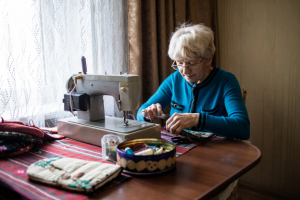 In modern society, clothes are almost a disposable item. They’re cheap and widely available, but often not made to last.
In modern society, clothes are almost a disposable item. They’re cheap and widely available, but often not made to last.
They’re also often not made here – and if global supply chains go down, they’ll quickly be in short supply.
Of course, most of us already have enough clothes to last us for a few years, but in a crisis, we could be putting more wear on them than usual, which would mean getting through them faster. And, if the crisis lasts long enough, any stockpile will eventually run down. Think of the Amish people. They don’t depend on anybody and they produce everything they need, including clothes. A good resource for how to get closer to real independence is The Amish Ways Book. There’s no place on the Internet where you can learn the skills that will allow you to become resilient and self-sufficient
In a long-term collapse, the ability to make your own clothes will be a huge benefit. You might run out of clothes, but in a disintegrating society, there will be plenty of fabric that can be repurposed. Curtains, bed linen, and even canvas tarps can be turned into clothes. In the longer term, being able to weave your own cloth is also a valuable skill – and what about turning animal hides into leather? The further back up the chain you can go, towards starting with natural materials and turning them into clothes, the more resilient you’ll be.
Meal Planning
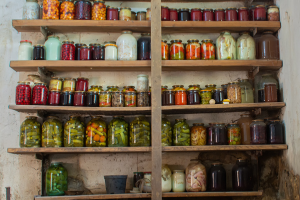 It doesn’t always seem like it, but food is incredibly cheap in our society. As a percentage of our income, we spend less on food than at any other time in history.
It doesn’t always seem like it, but food is incredibly cheap in our society. As a percentage of our income, we spend less on food than at any other time in history.
That’s good, in lots of ways – but it’s also made many of us casual, and even wasteful, about food.
How often do people throw a ready meal in the microwave, or order takeout? How many families don’t sit down to eat the same meal together, but just do their own thing? These are expensive and inefficient ways to eat. So is the common habit of snacking throughout the day.
In an economic collapse, with food supplies unreliable, it’s vital to be able to plan meals in advance around the ingredients you can get – just the way our ancestors did. They didn’t have each family member fixing their own dinner when they wanted, and eating it in front of the TV. They all sat down together at the table, for a good reason – that way, it’s much easier to keep everyone properly fed with nutritious but affordable meals. It saves time, food, and fuel, which will all be in short supply in an economic collapse.
I’ve started researching ways to meal plan on a budget and with no fancy gear or ingredients, just basic, long-lasting, and nutritious foods. And if you want to make sure you have a food supply in any situation, I highly recommend checking out The Lost Superfoods. This comprehensive guide provides invaluable information on over 126 survival foods that can be preserved and stored without refrigeration for years. It’s a great resource to help you build a stockpile of nutritious, long-lasting foods, giving you peace of mind when SHTF. Prepare now and ensure your family’s sustenance no matter what happens.
Foraging
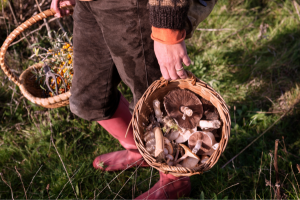 Most people have no idea about foraging anymore.
Most people have no idea about foraging anymore.
Food comes from the grocery store; things growing in hedges or woods are scenery, not food. That’s a very modern attitude though.
Our ancestors a century ago also bought most of their food in grocery stores, but they were much more open to the idea of foraging. Edible plants can do a lot to add variety and nutrients to a limited food supply. Some of them are even real luxuries – edible mushrooms and wild berries, for example. If you’re unsure about what grows in your area, The Forager’s Guide to Wild Foods will definitely be of great help. This book will show you how to identify plants, let you know which ones are edible or medicinal, and explain how to use them. It is filled with high-resolution, full-color, full-page images to make plant identification easy and accurate.
If the economy goes down, anyone who knows how to find (and recognize – the price for getting it wrong can be high) edible wild plants will have a huge advantage. Knowing how to forage will let you supplement your diet with fresh greens, fruit, nuts, and fungi.
Bow Making
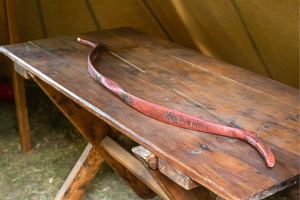 Many preppers reload their own ammunition. Keeping a stock of propellant and bullets, and recycling spent cases, is much cheaper (and lets you maintain a larger stockpile) than relying on factory-made ammo.
Many preppers reload their own ammunition. Keeping a stock of propellant and bullets, and recycling spent cases, is much cheaper (and lets you maintain a larger stockpile) than relying on factory-made ammo.
Some even own old-school muzzleloaders or other black powder weapons. Unlike modern propellant, you can make your own black powder, from charcoal, sulfur, and saltpeter, and if you have a bullet mold you can cast your own bullets from lead.
But what if even the old muzzle-loaders have worn out and there are no spare parts left? You could always go back to an older projectile weapon – the bow. Bows don’t stack up well against modern guns, but against an attacker who doesn’t have a gun it gives you a huge advantage, and it’s also effective for hunting. In fact bows can bring down any land animal on the planet. There are tribes in Africa who still hunt elephants with powerful longbows. Best of all, you can make one from natural materials.
Related: Survival Skills You’ll Need After the Collapse
There’s more to it than just finding a springy branch and adding a string, though. To make an effective bow you need to know how to choose the right wood, then shape it into a powerful weapon. It takes a lot of work to become an expert at that – but becoming good enough is achievable for any prepper. The same goes for making your own arrows. If you can make bows and arrows you’ll never run out of ammunition.
Hunting
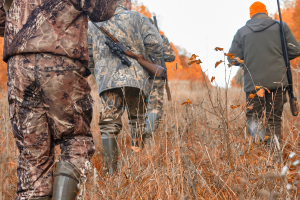 Like foraging, hunting is a great way to improve your diet when there’s less food in the shops. A few generations ago it was much more common for families to eat meat they’d harvested themselves. Hunting doesn’t just mean annual deer; rabbits, squirrels, and other small game are also valuable sources of protein.
Like foraging, hunting is a great way to improve your diet when there’s less food in the shops. A few generations ago it was much more common for families to eat meat they’d harvested themselves. Hunting doesn’t just mean annual deer; rabbits, squirrels, and other small game are also valuable sources of protein.
Trapping
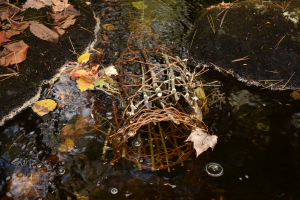 If hunting has a downside it’s that it takes time. You can spend a long time in the woods, and there’s no guarantee of success.
If hunting has a downside it’s that it takes time. You can spend a long time in the woods, and there’s no guarantee of success.
If you know how to make reliable traps that can be a much more efficient way of harvesting protein.
As long as you know where to put them – along game trails and around drinking spots, for example – once you’ve set a trap it will “hunt” 24/7. All you have to do is check your traps regularly. This is an amazing guide where you’ll discover not only the most efficient traps but also how to field dress game and how to store meat long-term.
Tending a Fire
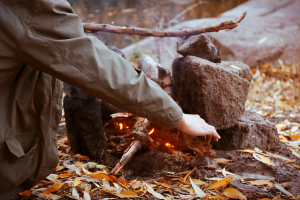 In a world where heat comes out of a furnace, the art of lighting and tending fires is one most people don’t have anymore.
In a world where heat comes out of a furnace, the art of lighting and tending fires is one most people don’t have anymore.
In an economic collapse, though, you might need to burn wood for cooking or heating.
The longer the collapse goes on the harder that’s going to get, because firelighters, butane lighters, and even matches will eventually run out. Can you light a fire with a Ferro rod and natural tinder? I rely on this guide. This isn’t your typical survival manual; it’s a practical tool that teaches you the forgotten wisdom of our ancestors who didn’t just survive in the wild – they thrived there and called it home. So, when you need to head for the hills, make sure this handbook is in your backpack; it could be your lifeline in uncertain times.
Once you have a fire lit, you also need to know how to keep it burning efficiently with the minimum amount of fuel. When you have to collect, cut, and season your own firewood you don’t want to waste it – but most people nowadays don’t know how to build an efficient fire. Mastering that skill will be very useful if our logistics-based society disintegrates.
Finding Water
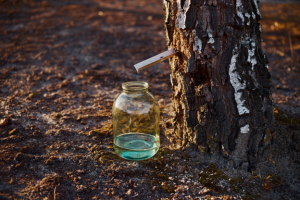 Unlimited clean, safe water you can get just by turning a faucet might not seem exciting, but it’s one of the biggest deals in modern life.
Unlimited clean, safe water you can get just by turning a faucet might not seem exciting, but it’s one of the biggest deals in modern life.
What happens if the economy is falling apart and local governments can’t afford to keep supplying purified water, though?
Then we’re back to the methods our ancestors used. That could mean digging a well, collecting rainwater, or tapping into a natural water source and directing part of the flow through a large-scale filter.
A few generations ago people were used to the difference between water that was clean enough for cooking and drinking, and water that was clean enough to be used for laundry or cleaning but wasn’t safe to drink. In an economic collapse that’s a habit we’ll need to get back into. Plus I always use This backpack-sized water generator that’s been a lifesaver, pulling clean, drinkable water directly from the air—up to 40 gallons a day—without relying on the grid. It can be a seamless addition to your preparedness, giving you peace of mind that you’ll always have safe water on hand, no matter the situation.
The good news is that even if you don’t already have these skills that were second nature to our ancestors, it isn’t hard to learn them. A lot of it’s just common sense. A lot more can be picked up by learning about history; there are plenty of books and online articles that will tell you how people lived 100 years ago. It’s definitely worth revisiting the knowledge our grandparents and great-grandparents had because they spent their whole lives getting by without the modern conveniences we take for granted. To them, what we would see as a survival situation was just everyday life – and they had the skills we might need someday soon.
You may also like:
 The First Place Everyone Will Run to When SHTF
The First Place Everyone Will Run to When SHTF
How to Build the Oven That Cooks Without Fire, Fuel, Smell, or Smoke (Video)
When Is It Okay to Open Fire on Intruders?
10 Forgotten Nose-to-Tail Recipes

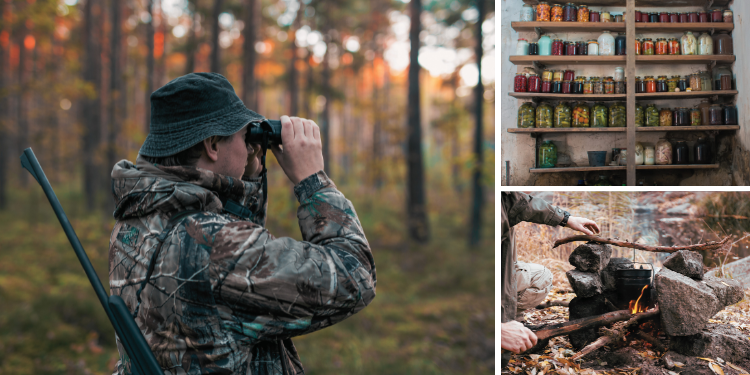













you talked about clothes wearing out but also kids growing out of old clothes and shoes. making your own shoes is a lost skill. i see, and have bought, traps at yar,d sales for about 5.00 each. some need a good oiling but work just fine. i’ve never used one but have them if it comes down to trapping for food. we have 2 grandkids that live with us and we eat at the table at dinner time and we take turns saying grace, like when i was little. no electronics are allowed at the table and get put up at 8:00 pm. i’m strict about the over use of electronics, thats the downfall of the younger generation. ok i’m done ranting. have a blessed day all.
Ya…Clothing for the grandkids….it’s weird how they like running around with out there daipers ….shredded cedar bark and moss I guess works o.k.So much to learn …So little time….
I refuse GPS. I tell people to use a paper map and a compass. They don’t listen. In a 5-day event covering 55 miles, my team was the only one to navigate through different terrains and get where we needed to be. One team only had one GPS and the battery was old and died. The other team had one fall over 100 meters. Trashed. I agree completely with poot and his limiting electronics. Learn the navigation skill and you won’t have to be searched for. The one team went the correct way using line of sight and guess work. They found the highway and walked to the main gate. They were not happy with all the pokes in the eye they got but the other team had to be find with helicopter and they really caught grief. Go a day with no electricity. No phone, games or anything and just see how dependent you are it. I am. I am old and in love with my ac. I do however use map and compass, build a fire, boil water from a lake and such trying to be self sufficient if I have to be.
I believe in map and compass as primary or a backup.
Many smartphone users will find their networks in a disaster will be useless to use google maps for navigating the terrain until the network in repaired.
Also the dated maps for navigation may not not have the updates of what is or was there, removed buildings and so on. So it is vital to keep our maps in relative current issue as best as possible. Or we can do minor recon of the area we are traveling through. Without alerting local population to become suspicious and start tracking or hunting our bug out party.
I find foraging for nearly everywhere. The place I have sought out many times asking Parks and wildlife, game wardens, Audubon society and biology teachers is the upper east Texas coast. The coast. Not East Texas. Western Louisiana Gulf of America coast. There are mimic plants. The edible is fine. The mimic is deadly and they are difficult to identify. Anyone know a link or book on Texas American Gulf coast foraging? Much obliged if you do.
Even the experts get fooled on the look a like plants, especially the mushrooms. It is good to know your plants, but it just takes one time. Growing your own garden plants is limited to your location and type of season you are in.
So we must be familiar with all prepping methods to survive until we get through the crisis.
And hopefully we don’t end up in a civilian or government tyranny as like the movie The Postman for reference.
Foraging books are a good reference, but still not all books show what to look for in the difference of the edible and the deadly look a like plants to compare with photos.
The local plant experts are good for their local areas. But remember they can make a mistake too.
Good luck in your plant identification for survival.
You really need to get personal with the plants currently around you .Eat just a little of one plant….see if you die…..then learn your next plant……a few days later….Watch out for possible pesticides…..dog urine….ect. there’s good sound protocol out there for eating weeds for the first time….I’ve been studying for 2 years now….alot to think about…be careful….be safe…..no hurry…at least right now.
Lol! If only skeeters were nutritious!
I never knew Texas was so strict with their plant laws…go figure…..western wa. is my back yard…great link…thanks
Strict on private property laws, not so much on plants. There is very little state or federal land in Texas so we’re limited where we can go. Back until around 1980 trespassing was okay so long as you weren’t hunting, it was traditional to leave hunting cabins unlocked with a stock of food in case somebody needed shelter. No more, crossing a fence (or a tree with a purple splotch of paint) to get to the pawpaw patch is risking freedom and life.
Howdy neighbor! I’m in rural south WA. Many good, local foraging sources available.
Watch out ….the greenies will throw your long horns in prison….before you know it….☮
You can open carry but don’t you dare touch them all plants……
Weirdo nonsense, maybe Lisa B in a new nag name?